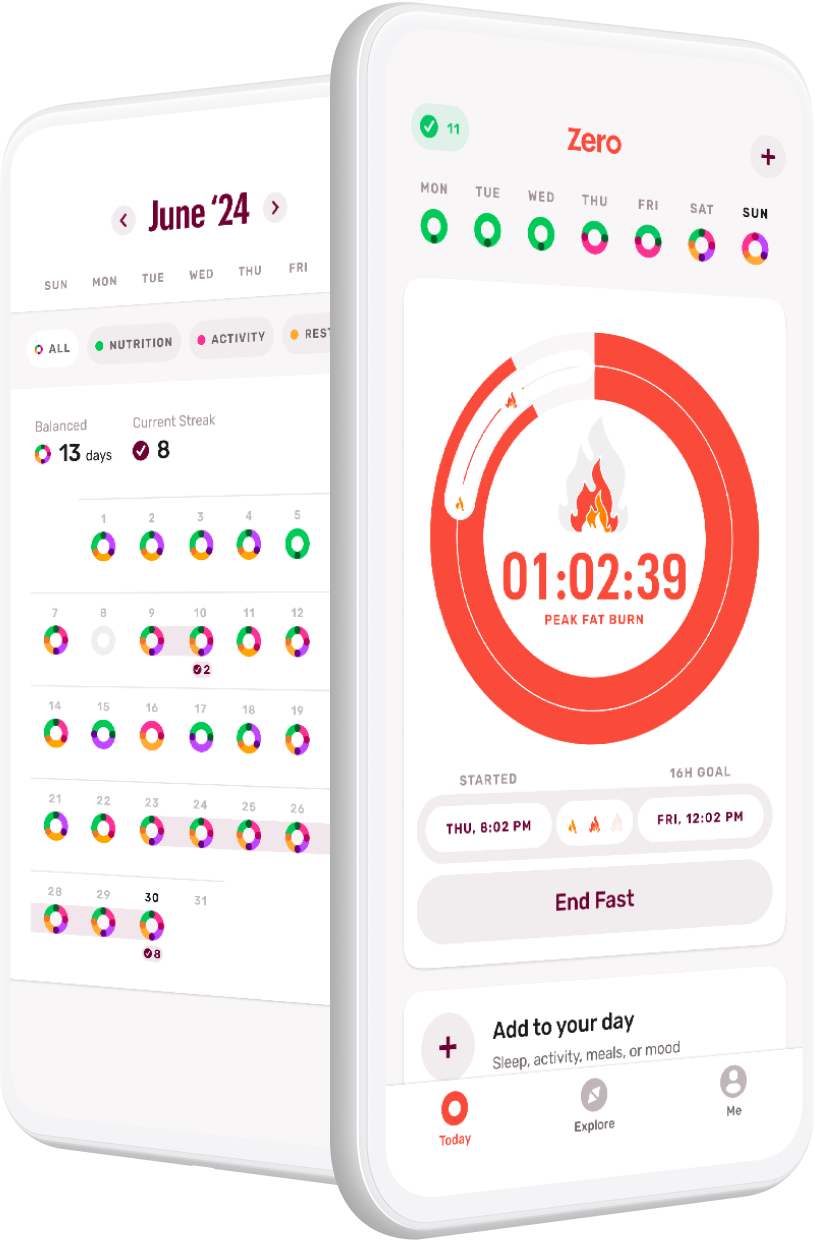When we think about building healthy habits, it’s normal for one of your first thoughts to be about hitting the gym. But as you’re building a fasting practice, is it safe and/or possible to keep working out? The short answer is likely yes. However, you shared lots of other questions with us on this topic, so our health advisor answered your most popular ones.
Q: I’ve heard fasted cardio in the morning has great benefits for fat loss but will fasted weight training still yield good muscle growth and fat loss?
A: Weight (aka resistance) training is good for muscle building and muscle maintenance no matter when you do it! Even in a fasted state—when you haven’t had any food immediately prior to working out—resistance training has been shown to stimulate mTOR activity. mTOR is a growth signaler in the body, important for muscle protein synthesis and muscle hypertrophy (increase in muscle size). Stimulating mTOR through resistance training should signal muscle growth with or without food.
But where does the energy come from to build that muscle? During exercise in a fasted state, your body mobilizes carbohydrates and fatty acids for energy. Despite common misconception, you’re unlikely to breakdown muscle/protein for energy even when you’re fasting. The only real difference between fasted weight lifting and fed weight lifting is the percentage of energy that comes from fat vs. carbs and glycogen. Studies have shown that acute resistance exercise in a fasted state compared to the fed state produces a lower respiratory exchange ratio (RER), indicating that you’re using more fatty acids for fuel rather than carbohydrates. It follows then that fasted weight lifting can result in more fat loss and better body composition.
To summarize: resistance training has plenty of benefits for body composition and muscle growth no matter when you work out, but those benefits may in fact be enhanced by training in the fasted state.
Q: I do OMAD—should I workout before or after my one meal? Also, should I do cardio or lift weights?
A: Whether you want to prioritize cardio or weight lifting entirely depends on your fitness goals. Weight/resistance training can increase muscle mass, improve bone density, contribute to better sleep, enhance cognitive function, and reduce stress. Similarly, cardio improves heart health, reduces the risk of neurodegenerative disease, improves blood sugar control, and improves mood.
So why are you doing this? Are you exercising for better performance? Better body composition? For cardiovascular health? If you’re exercising for performance—specifically long duration endurance—then eating before you workout will likely give you the most benefit, since it will provide your body with immediately usable carbohydrates or fatty acids to use for fuel. If you’re fat adapted, you’ll want fats to fuel your performance. Otherwise, you’ll want carbohydrates. But that’s probably the only instance in which you’ll want to eat before your workout.
For most other fitness goals, eating after your workout is preferable. Research has shown that weight lifting and shorter duration aerobic exercise (such as HIIT training) aren’t hindered by working out in a fasted state, and there’s a lot of upside to working out fasted. It’s been shown to enhance mitochondrial adaptations to using fatty acids (i.e. the body is better at burning fat) and increase glucose sensitivity.
It’s also possible to have a successful endurance workout in the fasted state, but likely only if you’re fat adapted, meaning you’re in “ketosis,” either from a ketogenic diet or a fasting regimen designed to train your body for fat burning.
Q: Does preworkout break a fast?
A: This depends on what’s in the pre-work out, and the goal of your fast. If you’re fasting for gut rest, anything with calories will technically break the fast since it’ll activate digestive enzymes, so check the nutrition label. If, on the other hand, you’re fasting to induce autophagy, decrease inflammation, lower blood glucose, etc., then a small number of calories will likely not have an impact.
The one caveat to this rule is a preworkout containing branched chain amino acids (BCAAs). BCAAs are often considered to be non-caloric on nutrition labels even though they stimulate mTOR, a signaler involved in growth pathways. This is especially true of leucine. Since mTOR inhibits autophagy, you’ll want to avoid BCAAs during your fasting window if you’re fasting for longevity, even if the supplement says it doesn’t have any calories.
Q: Should I train in the middle of my fast or at the end (right before my fast breaker meal)?
A: Again, it depends on your goal! Exercising at any point during your fast, specifically weight training, can help minimize muscle loss. So, on a longer fast, you’ll likely want to do regular resistance training—up to once per day throughout your fast. As mentioned above, fasted resistance training has been shown to stimulate mTOR activity, which aids in muscle synthesis. During prolonged fasts, you are at higher risk for muscle loss, so incorporating some resistance training into your fasting routine can help minimize that risk.
On a shorter fast, say a 16:8 TRF, it’s probably best to workout toward the end of your fasting window so you can “feed your workout” immediately afterward (more on this below).
On a longer fast, you might want to avoid endurance exercise since you’re at higher risk for electrolyte imbalances and fluid loss. For a shorter fast, however, endurance exercise can deplete glycogen and burn fat, especially toward the end of your fasting window. That way, your glycogen “tanks” are empty, so your body has somewhere to store any carbs you may ingest following your workout, which means fewer blood glucose spikes.
In summary: for a longer fast, regular resistance training is a good idea, but you may want to give the endurance workouts a rest. For shorter, daily fasts, either form of exercise is likely beneficial, especially toward the end of your fasting window.
Q: What should you eat after a fasted weight lifting session to avoid muscle loss? Similarly, what should you eat after a fasted cardio session?
A: In short? Protein. Yes, the time-tested, post-workout protein meal, be it in shake or whole food form, does have some research to back it up. Whether it’s a cardio or resistance workout, exercise puts your body in a catabolic state that mobilizes amino acids (building blocks of protein/muscle). Some studies have shown that ingesting protein post-workout increases myofibrillar protein synthesis, which contributes to overall muscle growth. So no matter what kind of exercise you’re doing, protein can help switch your body out of the catabolic “breakdown” state into an anabolic “repair and rebuild” state.
Another study of people on a TRF (time restricted feeding) protocol showed little difference in muscle growth/strength no matter when they ate their meals, so long as total protein intake remained constant. This suggests that TRF does not hinder performance at the gym, as long as you are meeting your total protein needs for the day. Again, a protein source such as chicken, fish, eggs, nuts, beans, or dairy will be an important part to your post-exercise meal.
In addition to the protein post-workout, a carbohydrate or a healthy fat source may also be appropriate, depending on your health goals, type of exercise completed, and the current diet you follow.
Q: What’s a recommended 16:8 fasting schedule for those who like to workout early in the morning?
A: Ideally, you would eat your first meal as soon as possible following your workout. This is the time your body is most sensitive to nutrients and when you have more opportunity for muscle growth.
When you eat a meal after glycogen-depleting exercise, you also have more room in your body’s “storage tanks.” So, when eating carbohydrates after a workout, more of that glucose can be transported to the liver and muscles to replete the glycogen stores instead of hanging around in the bloodstream. The same high carb meal will produce less of a glycemic response (i.e., rise in glucose and insulin) after a workout than before a workout. Additionally, as discussed above, having a post-exercise meal containing protein has been shown to increase myofibrillar protein synthesis, which contributes to overall muscle growth.
As an added bonus, starting your feeding window earlier in the day, and ending it earlier in the afternoon (a protocol known as “early TRF” or “eTRF”) has also been shown to provide additional health benefits. One study demonstrated increased insulin sensitivity, improved beta cell function, lowered blood pressure and oxidative stress, and a decreased appetite in the evening. Another study found that the early time restricted feeding (eTRF) group had lower 24-hour glucose levels, lower glucose levels at night, lower insulin levels, fewer glucose excretions and improved genetic markers for circadian rhythm.
If working out early in the morning, it’s a good idea to have your first meal of the day as soon as you can after you exercise. For example, if you finish your workout around 7AM, eat your first meal at 7:30, and begin your fast around 3:30PM, you should see multiple benefits for your overall health.
The trick to this of course is that dinner is often the most social meal of the day, so it may be harder to skip dinner than breakfast. You may need to find a balance between the “ideal” exercise/eating schedule, and the one you know you can stick to.
In summary…
Staying active during a fast is good—your fitness and fasting regimen can often go hand in hand. Again, work with your personal physician to build the plan that’s right for your needs.
Peter Attia will be showing you some of his preferred fasted workouts this week—follow @zerofasting for more. But first, he’s answering a few of your fitness + prolonged fasting questions:
- The Complete Guide to Fat Burning - April 30, 2024
- Zero Live #4: 3 Ways to Boost Fat Burning - March 28, 2024
- Zero Live #3: Nutrition, Fast Breakers, and Fasting - March 11, 2024




where else is your information available for me, as I don’t do Instagram Facebook or Twitter. thanks
Hi, I’m working out in the evening around 6pm and following a TRF from 8am-1pm. Is that fine for building muscle as I take my protein intake at 8am.
Hi. I am a 57year old lady. Doing IF 16/8. Second week. I weigh 87kg need to loose 17 kg. I am 1.6cm tall.
How many calories should I consume in eating period?
I cannot afford mealplans. Just need advice if permitted.
Kind regards.
Sandra
Hi Sandra,
Using an online calculator, assuming you’re completely sedentary, and you’re not planning on increasing your exercise, to maintain your current weight you’d need to eat 8363 kilojoules per day, and to lose 17 kg in a year you’d need to reduce it to 4512 kilojoules a day (not much more than 1000 Calories a day, which I think would be difficult to do for an entire year.
You can play around with the calculator and input your actual exercise levels:
https://www.niddk.nih.gov/bwp
Hi Sandra,
It appears I’ve entered the wrong numbers. To maintain your current weight, you’d need to eat 1713 Calories a day. To lose 17 kg in 12 months you’d need to reduce it to 1169 Calories a day (less if you increase your exercise).
I thought fasting brings down high blood pressure so I joined but after three days of fast my hbp cane up with 15. Why did it happen what did I do wrong ?
I workout early but have always struggled with breakfast. So I do 16:8 staring at 12noon and ending anytime between 17:00 and 20:00. Is this a problem ?
Thanks for an excellent article.
If I was to resistance train during an extended fast (3 days) would that still build muscle even though I’m not consuming protein and therefore not growing my muscle?
Hi, have lose around 1 pound and 1/2 a day. I start intermittent fasting on January 11th starting on 210 lbs. Now Today I weight 194.6
I fast 20/4. Normally I do planks in the mornings, and at the end of my eating window I do my exercises that is before I go to bed. And I know that the exercise has helped me a lot.
I have been doing IF for 20 days today. I lost only 4 pounds but my clothes fit way better. .. i have a lot if energy
Great info thanks
Good stuff! Love this app so much
Thank you for the help
I am a 65 yr old male in good health and over the past three months have adopted a 20:4 fasting routine. I have also been working with a trainer three times/week. The workouts are rigorous, primarily weight training. I workout in the morning at around 9am and break my fast at 3PM. I’ve noticed my %body fat trending up via my Withings (Nokia) scale. The absolute numbers may not be correct,but I do respect the trend. My weight has dropped from about 208lbs to 201lbs and has plateaued. What would cause this increase in %body fat?